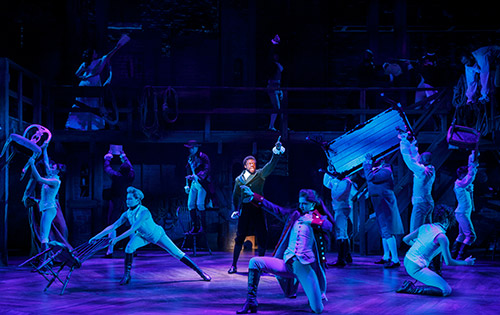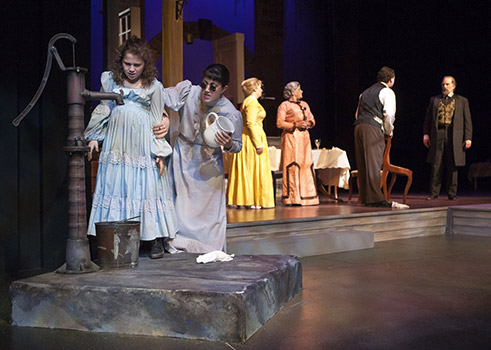Learn
Types of Theatres
There are many different types of theatre and each type has different goals.
Commercial vs. Not-For-Profit Theatre
Commercial theatre is a business within a community that attempts to make profits for investors.

A still from the touring version of Hamilton, a musical about Founding Father Alexander Hamilton noted for using hip-hop, rhythm and blues, pop, and soul music styles, as well as its color-conscious casting of non-white actors. Press photo © Joan Marcus, courtesy of Broadway San Diego.
It has a different goal from not-for-profit theatre. Not-for-profit theatre attempts to enrich a community and rolls all profits back into its operation. Most not-for-profit theatre is seen in communities scattered throughout the country. You may even have one in your own community! Many not-for-profit theatres are also amateur theatres, which is theatre performed by nonpaid actors, dancers, and singers. So, if you ever want to try your skills on the stage, check one out!

A still from a 2011 production of The Miracle Worker, a play about famous Alabamian Helen Keller, who was blind and deaf, and her teacher Annie Sullivan. Image courtesy of Theatre Tuscaloosa.
Broadway vs. Off-Broadway
Broadway theatre and Off-Broadway theatre are both considered commercial theatre. These 2 terms are used a lot, but what is the difference? Read the article and review the infographic on Playbill's website titled "What Is the Difference Between Broadway, Off-Broadway, and Off-Off-Broadway?" to learn about the differences.
After reading the article, let's test what you've learned. What's the main difference between Broadway and Off-Broadway theatres?
Educational Theatre
You spend so much time in school each day! What is the purpose? To learn, of course! There is a specific area of theatre referred to as educational theatre whose purpose is the same. It is theatre that has specific educational goals. So, what is the goal of educational theatre?

A still from a 2018 production of Shakespeare's The Tempest performed by middle and high school students. Image is licensed under CC BY 2.0.
The Washington Post article "The school play is about WHAT!? Controversy on stage and why it matters" recently commented about the controversy behind some school performances. Read the article and think about what you think the purpose of high school theatre should be!
Note: If you cannot access the article:
- Open Alabama Virtual Library.
- Scroll down and select Gale In Context: Opposing Viewpoints database.
- Search "The school play is about WHAT".
- This article "The school play is about WHAT!? Controversy on stage and why it matters" should be at the top of the results list.
The Goal
Although this lesson only brushes the surface of the different types of theatre, you should now see that the kind of theatre being produced is catered to a particular goal. But no matter what the goal, they must all make money in order to stay alive! The larger the theatre, the more money it takes to stage a production. That also means the larger the theatre, the more money a producer can make for investors!
Budgets
Max Bialystok in Mel Brooks' The Producers states: "Never put your own money in the show!"

This still is from the UK Amateur Premiere of The Producers staged by the Act Too Group in September 2008. Image by Acttoogroup is licensed under CC BY 3.0.
The only way for a producer to raise money is to convince investors that his show is worth taking a risk on! The producer must prove that he is a good manager of money and has the skills needed to put together a great production team that will one day create a box office sensation! This all starts with a theatre budget, which is an estimate of income and expenses for a theatrical production.
A budget is based on the type of production being done. For example, a commercial production on Broadway will have a much larger budget than an amateur production at your local community theatre. Lin Manuel-Miranda's hip-hop sensation, Hamilton, has a budget that keeps growing and growing. Read the article 'Hamilton' Inc.: The Path to a Billion-Dollar Broadway Show from the New York Timesto learn more about how budgeting works on Broadway.
So, what does a budget look like? Budgets can take many forms, but Theatre Group has one example broken down with explanations.
In the end, it is all about having a game plan! With a clear plan of attack, a producer can make the most out of the money they have been loaned and with the right creative team have the hit they dreamed of.

